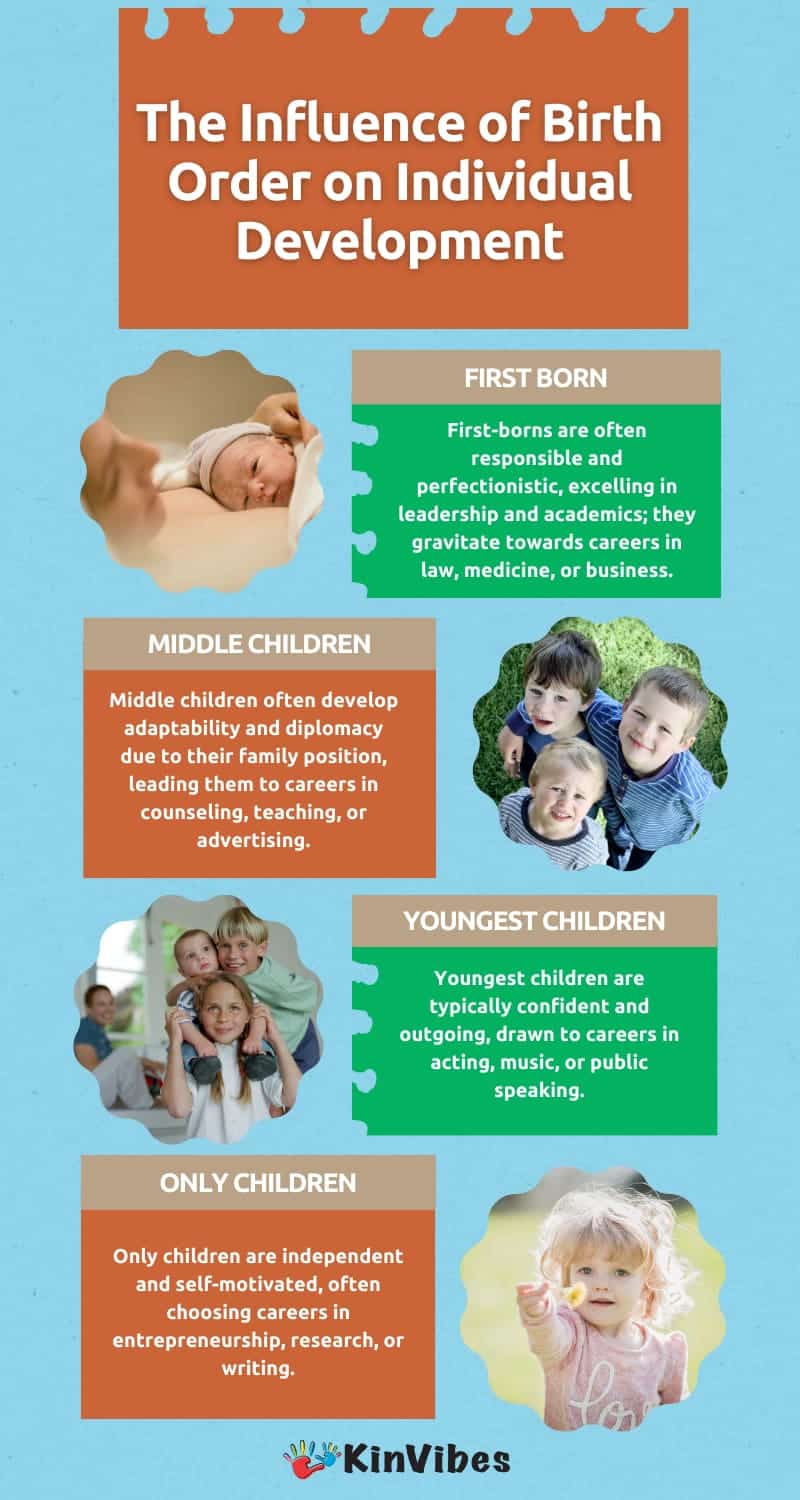Family Dynamics
The Influence of Birth Order on Individual Development

Birth order, the sequence of a child’s position within a family, is thought to shape individual development significantly. Numerous studies have delved into its impact on personality, achievements, and overall mental health professional growth.
Despite sharing the same upbringing, siblings can exhibit distinct personalities and life perspectives due to birth order.
Research links birth order to specific personality traits and career choices. Recognizing birth order’s influence can enhance understanding of family dynamics and individual growth.
WHAT IS BIRTH ORDER?

Birth order, the sequence in which children are born in a family, significantly influences individual development. Firstborns are often responsible leaders, middle children are cooperative negotiators, youngest siblings are outgoing communicators, and only the eldest children, being the sole focus, tend to be mature achievers.
While birth order offers insights into personality traits and relationships, one of many factors, including genetics and parenting style, shapes individual growth.
THE INFLUENCE OF BIRTH ORDER ON INDIVIDUAL DEVELOPMENT

Did you know that your birth order can significantly impact your individual development?
In this section, we’ll explore the fascinating influence of birth order on personalities and life outcomes. From the traits commonly observed in first-born children to the unique experiences of the middle child syndrome first children, youngest children, and only children, we’ll uncover how birth order shapes who we become.
Get ready to gain insights into your own development and the dynamics within your family!
First-Born Children
First-born children often emerge as family leaders with high expectations for achievement. They’re usually responsible, organized, and aim for perfection. Academically, they tend to outshine their siblings and often pursue advanced education.
Their heightened sense of responsibility can lead them to caregiving roles.
Research indicates they possess greater conscientiousness and assertiveness than their younger counterparts.
However, these traits can differ based on family dynamics and individual differences within birth order. When nurturing first-borns, balancing support with freedom is essential, allowing them to forge their identities.
Middle Children
Middle children, positioned between older and younger siblings, experience unique developmental influences. They’re often adept at negotiation and mediation, honing these skills from managing sibling dynamics. Their independence and self-reliance stem from receiving less attention than first-borns, pushing them to carve their own paths.
Their keen observation of siblings enhances their empathy and adaptability in social settings.
However, they might sometimes feel overshadowed, prompting them to excel to gain recognition. Benefiting from their family position, they often mentor younger siblings while learning from older ones. It’s essential to remember that while birth order impacts development, individual experiences and family dynamics also play pivotal roles.
Youngest Children
Youngest children often enjoy ample attention from family members, boosting their self-esteem and confidence.
They tend to be independent, drawing insights from their older siblings’ experiences, and usually have the liberty to explore and decide for themselves. While they might shoulder fewer responsibilities, it’s vital for parents to ensure they gain essential life skills over time. Early exposure to social interactions, thanks to older siblings’ circles, refine their social adaptability.
They might also harbor a competitive streak, aiming to shine amidst their siblings.
Their unique perspectives can introduce refreshing dynamics within the family. By recognizing their distinct needs, parents can guide the youngest children toward holistic development.
Only Children
Only children without siblings experience unique advantages and challenges. They often enjoy undivided parental attention, boosting their self-esteem and granting them better educational and extracurricular opportunities.
This focused attention can also deepen parent-child bonds. However, they might miss the social and emotional growth that comes from sibling interactions, potentially facing challenges in sharing or collaborating.
They might also feel heightened pressure as the family’s sole representative.
While experiences vary among only children based on family dynamics and external relationships, it’s essential to foster their social skills and independence. Promoting external social interactions, teamwork opportunities, and a balance of support and personal growth exploration is beneficial for parents of only children.
FACTORS THAT SHAPE BIRTH ORDER EFFECTS

Siblings. Parents. Family dynamics. These are the factors that shape birth order effects. Delving into the family environment, parental expectations, and sibling relationships, we’ll uncover how these elements intertwine and mold an individual’s development. What role does birth order play in shaping our personalities?
How do parental expectations influence our paths in life?
Family Environment
The family environment, which encompasses various elements such as sibling relationships, parental expectations, family resources and opportunities, parenting styles, and cultural and socioeconomic factors, plays a crucial role in shaping the development and experiences of individuals based on their birth order. The dynamics and interactions within the family significantly impact each child’s upbringing and personality traits.
Sibling relationships: The family environment heavily influences the relationships between siblings, contributing to their development. The interaction patterns, whether characterized by cooperation or rivalry, shape how individuals perceive themselves and others. Siblings offer companionship, support, and competition, which are crucial to their growth.
Parental expectations: The family environment sets the tone for parental expectations, which differ depending on birth order. First-born children often face higher expectations and responsibilities as they receive more attention and accountability. Middle children may feel the need to compete for attention, while youngest children might experience more leniency and indulgence.
Family resources and opportunities: The family environment determines the resources available to each child, such as financial support, access to education, and extracurricular activities. These factors significantly influence their educational achievements, career choices, and overall success in life.
Parenting styles: Different family environments can have distinct parenting styles, including authoritative, permissive, or authoritarian approaches. These parenting styles directly impact a child’s social and emotional development, self-esteem, and ability to navigate relationships beyond the family.
Cultural and socioeconomic factors: Cultural values, traditions, and socioeconomic status heavily influence the family environment. These factors shape the opportunities and experiences available to children, including exposure to diverse perspectives and experiences.
Research shows that the family environment, encompassing all these factors, influences birth order effects and various aspects of an individual’s life. This influence extends to their mental health, well-being, and future relationships. It highlights the family environment’s significant role in shaping individual development.
In a piece I’ve penned, ‘The Silent Impact: Understanding Uninvolved Parenting Styles,’ I get deep into the subtleties and consequences of this often-overlooked approach. It’s a compelling read highlighting the unseen ripples of such a style.
Parental Expectations
Regarding the influence of birth order on individual development, parental expectations, or the expectations that parents have for their children, play a significant role. Here are some key points to consider regarding parental expectations:
- Parental expectations tend to be higher for first-born children. Being the oldest, parents often have higher expectations for their firstborn’s achievements and behavior.
- First-born children may feel pressure to meet these expectations of being responsible, reliable, and successful. They may strive to fulfill their parents’ expectations and seek approval and validation in doing so.
- For middle children, parental expectations may vary. They may receive less attention and have fewer expectations than their older sibling. This can sometimes lead to a sense of independence and the freedom to define their own path.
- Youngest children often benefit from lower expectations. As the baby of the family, they may receive more leniency and tolerance from parents. This can also result in younger siblings feeling less pressure to reach certain milestones or achievements.
- Parental expectations can influence a child’s self-esteem and motivation. Children are more likely to feel confident and motivated to succeed when expectations are reasonable and supportive. Conversely, unrealistic or overly demanding expectations can lead to feelings of stress and inadequacy.
- It is important for parents to consider the individual strengths and abilities of each child and set appropriate expectations accordingly. Tailoring expectations to each child’s unique characteristics can foster a positive and nurturing environment for their development.
Understanding the impact of parental expectations is crucial in understanding how birth order affects the development of each child. By being mindful of the expectations placed upon them, parents can create a supportive environment that nurtures their first child one’s growth and well-being.
Sibling Relationships
Sibling relationships significantly influence a child’s development and can positively and negatively shape family dynamics. These relationships often represent a child’s first friendships, offering lifelong companionship and emotional support. While healthy competition among siblings can spur personal growth, excessive rivalry might breed resentment.
Cooperation between siblings fosters teamwork skills valuable in life, and they play a pivotal role in shaping each other’s identities. During tough times, siblings can be a crucial emotional pillar. Parents should promote open communication, teach conflict resolution, and encourage empathy to maintain positive relationships.
Quality time and shared activities can further strengthen these bonds.
Recognizing and celebrating each sibling’s uniqueness can foster mutual respect. Prioritizing open communication and understanding each child’s unique qualities is key to navigating sibling dynamics effectively.
BENEFITS AND CHALLENGES FOR DIFFERENT BIRTH ORDERS

Birth order can significantly influence an individual’s development. From eldest siblings taking leadership roles within same family, middle children balancing between roles, youngest siblings enjoying a relaxed dynamic, to only children receiving undivided attention, each position offers unique benefits and challenges.
First-Born Children
First-born children often have a heightened sense of responsibility and naturally lean into leadership roles, thanks to their unique position in the family. Research indicates they typically achieve greater academic success, possibly due to the focused attention they receive early on.
They also tend to be more conscientious and rule-abiding, striving for perfection. While they benefit from maturity and independence by caring for younger siblings, they also face pressures from heightened parental expectations. Their strong desire for approval drives their academic and extracurricular achievements.
Middle Children
Middle children, positioned between the first-born and youngest, possess distinct traits shaped by their unique family roles. Often feeling overshadowed by their siblings, they might seek ways to gain attention or establish their own identity within the family.
Their intermediary position hones their negotiation and mediation skills, fostering harmony among siblings. Their interactions with both older and younger siblings enhance their adaptability and social skills. With less direct parental focus, they often grow independent and resilient, sometimes leading them to pursue unconventional paths or take risks.
Parents should offer individual attention other children, encourage their self-expression, and recognize their accomplishments to support middle children.
Youngest Children
The youngest children in families have distinct experiences influenced by their psychological birth order position. They often enjoy ample attention, leading to boosted confidence, especially around older siblings. Their position allows them to explore their interests, enhancing creativity.
As older siblings grow independent, youngest children often gain more freedom, fostering self-reliance. They can also become family mediators, honing their conflict-resolution skills. To support them, it’s essential to encourage independent thinking and decision-making while providing the right balance of support.
Only Children
Only children, being the sole recipients of their parents’ attention, have distinct experiences. They often possess advanced social skills from interacting more with adults and diverse groups outside their family. This exposure fosters maturity and comfort in adult settings. Their independence is evident early on, boosting self-confidence. With no siblings around, their creativity flourishes as they engage their imaginations deeply. Their undivided parental attention nurtures a close bond, ensuring emotional security.
KinVibes Pro-tip: While being an only child can have its advantages, it is important for parents to provide opportunities for social interactions with peers to foster the development of social skills and the ability to navigate various social dynamics.
BIRTH ORDER AND PERSONALITY TRAITS

Explore how birth order can shape our personality traits as we delve into the fascinating realm of birth order and its influence on individual personality development.
From conscientiousness to openness to experience, we’ll uncover how the birth order research and in which we enter our family can impact our unique characteristics. Uncover the remarkable connections between birth order and personality and understand how these factors intertwine to shape who we are.
Conscientiousness
Conscientiousness, linked to organization and responsibility, can be influenced by birth order. First-borns often display higher conscientiousness, likely due to their leadership roles and desire to set examples. Middle children’s conscientiousness varies; those with older siblings might be more driven, while those with younger siblings might be more nurturing. Youngest children typically exhibit lower conscientiousness, being more spontaneous and less structured, as they’re often cared for by older siblings.
Fact: Research has shown that birth order effects on conscientiousness are modest and can be influenced by various other factors, such as parenting style and individual personality traits. While birth order may contribute to differences in conscientiousness among siblings, it is not the sole determinant of this personality trait.
Agreeableness
is a personality trait that is influenced by birth order. It refers to a person’s tendency to be cooperative, kind, and considerate towards others. Research has shown that birth order can impact individuals’ agreeableness development.
| Birth Order | Level of Agreeableness |
|---|---|
| First-Born Children | Middle children, being sandwiched between older and younger siblings, often develop good negotiation and conflict-resolution skills. This can enhance their agreeableness as they learn to navigate different personalities and maintain harmony within the family. |
| Middle Children | Middle children, being sandwiched between older and younger siblings, often develop good negotiation and conflict resolution skills. This can enhance their agreeableness as they learn to navigate different personalities and maintain harmony within the family. |
| Youngest Children | Youngest children often receive a lot of attention and care from their older siblings and parents. This can boost their agreeableness, as they are used to positive interactions and cooperation with others from a young age. |
| Only Children | Only children may have slightly lower levels of agreeableness compared to those with siblings. Without the experience of having to negotiate and share resources with siblings, only children may have less exposure to situations that enhance agreeable behaviors. |
It’s important to note that birth order is just one of many factors that can influence a person’s level of agreeableness. Individual temperament, parenting style, and other environmental factors also play a role. People can cultivate and enhance their agreeableness through conscious efforts to be kind, considerate, and cooperative in their interactions with others.
Openness To Experience
Openness to experience is a personality trait that is influenced by birth order. It refers to an individual’s willingness to try new things, be open-minded, and embrace new experiences. Here are some factors that influence the level of openness to experience in individuals based on their birth order:
- First-Born Children: First-born children often exhibit higher conscientiousness and less openness to experience than their younger siblings. This can be attributed to their role as the responsible and reliable eldest child.
- Middle Children: Middle children tend to have a higher level of openness to experience than first-born and youngest children. Being in the middle, they often have more exposure to different perspectives and experiences from their older and younger siblings.
- Youngest Children: Youngest children typically have the highest level of openness to experience among their siblings. Growing up, they benefit from the influence and exposure to their older siblings’ interests and experiences, which leads to a more adventurous and open-minded personality.
- Only Children: Only children tend to have a mix of traits from both first-born and youngest children. They often exhibit high levels of openness to experience, as they have undivided attention from their parents and are exposed to various experiences throughout their upbringing.
It is important to note that birth order is just one factor among many that can influence an individual’s level of openness to experience. Personal experiences, upbringing, and individual differences all play a significant role in shaping this personality trait.
In another piece I’ve written, titled ‘Freedom or Overindulgence: Unpacking Permissive Parenting Styles,’ I delve into the nuances of this method. It’s an eye-opener and offers a fresh perspective on the fine line between liberty and excess.
Neuroticism
Neuroticism, a trait indicating susceptibility to negative emotions, is influenced by birth order. First-borns generally exhibit lower neuroticism due to receiving more parental attention, fostering confidence. Middle children might display higher neuroticism, feeling overshadowed by siblings.
Youngest children, while outgoing, can show elevated neuroticism due to their impulsive nature and attention-seeking behavior.
While birth order plays a role, genetics and environment are also influential. Notably, Sigmund Freud, the pioneering psychoanalyst and a first-born, might have had his theories shaped by his birth order and observations of his siblings. Individual differences should always be considered.
Extraversion
Extraversion, a trait indicating sociability, is influenced by birth order. Firstborns often exhibit higher extroversion due to early parental attention. Middle children, navigating between older children and younger siblings, display balanced extraversion.
Youngest children might be more extroverted, seeking attention, while only children with undivided parental focus can also be highly extroverted. Though birth order plays a role, genetics and environment matter too.
A social environment, group activities, and open family communication are beneficial to nurture extraversion. Recognizing birth order’s impact on extraversion aids in understanding individual and family dynamics, fostering harmonious relationships.
BIRTH ORDER AND ACHIEVEMENT

Birth order has long been a topic of fascination when it comes to understanding how it impacts the development of individuals. In this section, we’ll dive into the intriguing relationship between how birth order affects personality and achievement. We’ll explore how academic success, leadership skills, and career choices can all be influenced by the order in which individuals are born in a family. Prepare to uncover the fascinating ways in which birth order can shape our paths to success.
Academic Success
Academic success is greatly influenced by birth order and may vary among siblings. First-born children tend to achieve high academic success due to their parents’ focused attention and higher expectations.
They receive more guidance and support throughout their educational journey than the second child. Middle children may face challenges in reaching the same level of academic success as first-borns since they may receive less attention and resources from their parents. However, middle children often develop strong problem-solving and social skills, which contribute to their overall academic success.
The youngest children can benefit from the guidance and support of their older siblings, positively impacting their academic performance. They also tend to receive more attention and praise from their parents than middle born children, which serves as motivation to excel academically. Similarly, only children, like first-borns, often experience high academic success as they receive undivided attention and resources from their parents.
While birth order is an important factor influencing academic success, it is crucial to consider other elements. The family environment, parental expectations, and sibling relationships also play significant roles. A supportive and nurturing family environment fosters a positive attitude toward education and enhances academic success. The expectations set by parents can motivate children to strive for excellence in their studies, while sibling relationships, whether supportive or competitive, can impact a child’s motivation and drive for academic achievement.
Birth order undeniably has a notable impact on which child is born and academic success. However, it is essential to consider other factors that contribute to a child’s educational journey. Each child’s strengths, motivations, and learning styles should be considered to ensure their academic success.
Leadership Skills
When it comes to birth order differences and individual development, leadership skills can be influenced by the position a person holds within their family. Here are some factors to consider:
- First-born children:
- First-born children often possess exceptional leadership skills as they tend to take on responsibility early in life.
- They may naturally develop an innate ability to organize and delegate tasks, making them highly effective leaders.
- As the oldest, they may also feel a sense of authority and responsibility to guide their younger siblings.
- Middle children:
- Middle children often develop impressive negotiation and diplomacy skills due to their position between older and younger siblings.
- They learn to navigate conflicts and find common ground, which can be invaluable in leadership roles.
- Middle children may also possess adaptable personalities, making them highly effective at managing different personalities within a team.
- Youngest children:
- Youngest children often exhibit remarkable communication skills as they learn to assert themselves in a family dynamic where older siblings may dominate.
- They may possess charisma and high energy, qualities that can be highly beneficial in leadership roles.
- Youngest children may also demonstrate creative problem-solving abilities, thinking outside the box to find innovative solutions.
- Only children:
- Only children often develop notable independence and self-reliance, as they do not have siblings to rely on.
- They may possess strong decision-making skills and the ability to take initiative.
- Only children frequently excel in leadership roles that require self-motivation and autonomy.
It’s important to note that birth order is just one-factor influencing leadership skills. Other factors such as upbringing, education, and individual personality traits also play a significant role.
Career Choices
When it comes to career choices, birth order can have an influence on an individual’s decision-making process and overall career path. Here are some factors to consider:
- First-Born Children: First-born children often strongly desire to succeed and take on leadership roles. They may be more likely to choose careers that require responsibility and ambition, such as law, medicine, or business.
- Middle Children: Middle children tend to be adaptable and diplomatic. They may choose careers that involve working with people and finding creative solutions, such as counseling, teaching, or advertising.
- Youngest Children: Youngest children are often outgoing and enjoy being the center of attention. They may gravitate towards careers that allow them to perform and entertain, such as acting, music, or public speaking.
- Only Children: Only children are often independent and self-motivated. They may choose careers that allow them to work autonomously and pursue their own interests, such as entrepreneurship, research, or writing.
While birth order can provide some insights into potential career choices, it is important to remember that individual interests, skills, and experiences also play a significant role. It is essential for individuals to explore their passions and strengths to make informed decisions about their career paths.
FREQUENTLY ASKED QUESTIONS
How Does Birth Order Influence The Development Of The Oldest Child?
According to birth order theory, being the oldest child often means receiving a lot of attention from parents who are new to parenting. This attention can benefit the oldest child, who may be expected to set an example for their younger siblings. Research suggests that oldest children tend to demonstrate leadership skills and may be more likely to succeed in their careers.
What Characteristics Are Common Among Middle Children?
Middle children often seek to carve out a unique role within the family dynamic. They may enjoy negotiation and compromise, and can relate well to people of different ages. Middle children may also compete with their older siblings or exhibit rebellious behaviors.
How Does Birth Order Influence The Development Of The Youngest Child?
The youngest child’s personality may take one of two paths. They may strive for success and excel in various areas, becoming the go-to person in the family. Alternatively, they may become avoidant if they lack confidence or drive. Youngest children often have more freedom and can be creative, rebellious, and outgoing.
Do Social Factors Play A Role In The Influence Of Birth Order On Individual Development?
Yes, social factors can contribute to the influence of birth order. Firstborn children, for example, are often surrounded by adults during their early years, which may enhance their language skills. They also tend to take on a leadership and teaching role with their younger siblings later born children, which can positively impact their own intelligence.
Is There A Correlation Between Birth Order And Intelligence?
While some theories suggest that firstborns have higher IQs, recent studies indicate that the difference is only around 1 point on average. Social factors, such as being surrounded by adults and taking on teaching roles, may contribute to this slight advantage.
Does Birth Order Have An Impact On One’s Health?
No evidence suggests that birth order significantly affects one’s health outcomes. Whether someone is a firstborn child, a middle child, the youngest, or an only child does not predict their health. Other factors, such as genetics and lifestyle choices, play a more significant role in determining an individual’s health.
WRAPPING UP
The intricate dance of birth order plays a pivotal role in shaping the mosaic of individual development. From the leadership tendencies of first-borns to the balancing act of middle children and the vibrant assertiveness of the youngest, each position carries its unique strengths and challenges.
While birth order provides a compelling lens to understand developmental nuances, it’s essential to remember that it’s just one of many factors. Genetics, environment, and personal experiences also interplay in this complex journey of growth.
As we delve deeper into the influence of birth order, we gain insights into our behaviors and tendencies and a broader understanding of those around us. This knowledge empowers us to foster stronger, more empathetic relationships and appreciate the rich tapestry of individual differences that each family member brings to the table.
Have you ever wondered about striking the right balance between being caring and setting rules? In another article, ‘Balancing Warmth and Discipline: The Benefits of Authoritative Parenting Styles,’ I get into this topic. It’s a personal favorite and sheds light on how this balance can make all the difference.
